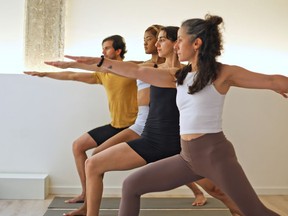How UHN and the Canada India Foundation are innovating care models through the power of yoga
Yoga has many health benefits, and UHN and the Canada India Foundation aim to help patients reap those benefits through a new yoga-focused complementary health program

Article content
The best types of care plans employ a multi-pronged approach, offering various levels of in-depth care and symptom relief to enhance a patient’s overall quality of life and health outcomes. However, the presence of holistic health practices are often kept separate from traditional care.
UHN Toronto Rehab, in partnership with the Canada India Foundation, aims to change that for patients with its new integration program, designed to advance rehabilitation for individuals with various chronic conditions, including cardiovascular disease, cancer, chronic kidney disease, and diabetes.
The Medical Director of the Cardiovascular Prevention and Rehabilitation Program at UHN, Dr. Paul Oh, is leading the new initiative, which has introduced yoga into the care mix due to its science-backed ability to improve various facets of health.
Yoga as a formal prescription for better health
Yoga is an ancient practice that originated over 5,000 years ago. It involves combining various physical movements and poses, along with breathing and relaxation techniques, to enhance both physical and mental well-being. It is often used in holistic health to strengthen the body, reduce stress and mental anguish, and improve flexibility and mobility.
Recent scientific investigations into yoga have found that it can do a great deal more than that, especially when practiced by individuals living with various chronic diseases. Regular yoga practice has been shown to reduce systemic inflammation while also enhancing immune responses throughout the body.
It has also been shown to reduce stress levels, improve mental health scores, and help manage blood glucose levels. Cholesterol levels and blood pressure can also be positively impacted by yoga. According to Johns Hopkins Medicine, yoga can also:
- Reduce the symptoms of arthritis
- Reduce chronic pain
- Improve sleep
- Increase energy
All of these benefits put together can significantly improve the quality of life for people living with chronic diseases.
Improving patients’ lives through the power of yoga
The program, created by Toronto Rehab and the Canada India Foundation, offers yoga sessions within the cardiac rehab program to patients, with sessions running through the 2025/2026 calendar year. So far, these sessions have been met with praise from patients and are only growing in popularity because people can really feel the difference.
For those with limitations, modifications are available so that no one has to push too far past what they’re capable of while still reaping the benefits of the new program. The program leaders, including Dr. Oh, have one primary goal: to enhance the quality of life for individuals living with cardiac conditions by improving both physical and mental health.
While the program focuses heavily on cardiac patients, to celebrate International Day of Yoga on June 21, 2025, they’ve opened their registration to all UHN patients and staff, cardiac rehab graduates, and friends or supporters of Canada India Foundation.
Each person can participate in a special yoga class for the International Day of Yoga, regardless of their ability. They can register for the class to introduce themselves to the practice or, if they’ve already integrated yoga into their personal self-care plan, to join the community at UHN and the Canada India Foundation.
People can register via email by contacting Priscilla Gonsalves at priscilla.gonsalves@uhn.ca to join in on the fun and well-being-driven event.














